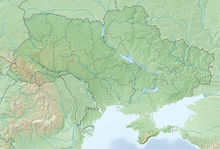 Global Information
Global InformationBattle of Poltava information
You can help expand this article with text translated from the corresponding article in Swedish. (October 2022) Click [show] for important translation instructions.
|
| Battle of Poltava | |||||||
|---|---|---|---|---|---|---|---|
| Part of the Swedish invasion of Russia during the Great Northern War | |||||||
 The Battle of Poltava by Louis Caravaque | |||||||
| |||||||
| Belligerents | |||||||
|
|
| ||||||
| Commanders and leaders | |||||||
|
|
| ||||||
| Strength | |||||||
|
Swedish combined army: Total: up to 30,000[4][5][d] Participated in battle: Total: 16,500 Besieging Poltava: 1,100 infantry 200 cavalry |
Russian combined army: Total: 75,000[2] Participated in battle: Total: 42,000 Garrison of Poltava: 4,200 infantry 2,000 Cossacks 28 cannons | ||||||
| Casualties and losses | |||||||
|
Swedish accounts: 6,900 killed and wounded, 2,800 captured.[6][7][8] Russian accounts: 9,234 killed, 2,864–2,977 captured.[9][10][11] |
Official accounts: 1,345 killed, 3,290 wounded.[7][10] | ||||||
 class=notpageimage| Location within Ukraine Battle of Poltava (European Russia) | |||||||
The Battle of Poltava[e] (8 July 1709)[f] was the decisive and largest battle of the Great Northern War. A Russian army under the command of Tsar Peter I defeated a Swedish army, under the command of Carl Gustaf Rehnskiöld. The battle put an end to the status of the Swedish Empire as a European great power, as well as its eastbound expansion, and marked the beginning of Russian influence in Northern Europe.
During the course of six years in the initial stages of the war, King Charles XII and the Swedish Empire had defeated almost all participants in the anti-Swedish coalition, which initially consisted of the Polish-Lithuanian Commonwealth, Denmark-Norway and the Tsardom of Russia. The latter under Tsar Peter I's rule was the only one still fighting. Charles XII therefore chose to invade Russia in the autumn of 1707 and march towards Moscow with a large Swedish army. However, the campaign was complicated by harsh weather conditions and by the Russians applying scorched earth tactics[13]: 704 and surprise attacks, which forced Charles XII to interrupt his march on Moscow and instead march south to establish winter quarters with the help of Ivan Mazepa, hetman of the Cossack Hetmanate Zaporizhian Host.
After the extremely harsh Great Frost of 1708–1709, the weakened Swedish army resumed operations in the spring of 1709 and began a siege of the fortress of Poltava, an important trading center and military depot on the Vorskla. Meanwhile, a numerically superior Russian army of 75,000–80,000 men[2] commanded by Peter, advanced to Poltava in order to relieve the siege. The two armies clashed, and ended with the Swedes being defeated and fleeing the battlefield. Charles and Mazepa retreated with 1,500 men south to the river Dnieper, which they crossed, thus managing to escape the Russians and established themselves in the Ottoman Empire.[13]: 710 The rest of the army was forced to surrender to the Russians at the village of Perevolochna on 11 July 1709.[14]
The Battle of Poltava, as well as the subsequent capitulation, ended in a decisive victory for Peter I and became the greatest military catastrophe in Swedish history.[15][16][17] It marked a turning point in the continuation of the war in favour of the anti-Swedish coalition, which as a result of the battle was revived and with renewed vigor attacked the weakened Swedish Empire on several fronts. The battle thus marked the end of Sweden's time as the dominant power in Northern Europe, a position which after the war was taken over by the Russian Empire. The battle is therefore of crucial importance in the history of Sweden as well as Russia and Ukraine.
Cite error: There are <ref group=lower-alpha> tags or {{efn}} templates on this page, but the references will not show without a {{reflist|group=lower-alpha}} template or {{notelist}} template (see the help page).
- ^ Mackiw, Theodore (2008). "Poltava, Battle of". Canadian Institute of Ukrainian Studies.
- ^ a b c d e f g h Moltusov, Valerij Aleksejevitj (2009). Poltava 1709: Vändpunkten (in Swedish). SMB. p. 93. ISBN 978-91-85789-75-7.
- ^ a b (in Russian) О составе русской и шведской армий в Полтавском сражении Archived 2019-10-06 at the Wayback Machine
- ^ Ericson, p. 297.
- ^ (in Russian) Istorīia Petra Velikago, by Nikolai Alekseevich Polevoi, 1843, p. 38.
- ^ Englund (1988), p. 215.
- ^ a b (in Swedish) Christer Kuvaja: Karolinska krigare 1660–1721, p. 192. Schildts Förlags Ab 2008. ISBN 978-951-50-1823-6.
- ^ Derek Wilson (9 March 2009). "Poltava: the Battle that Changed the World". History Today. 59 (3). London: 23–29.
- ^ (in Russian) Битва под Полтавой Archived 2005-02-25 at the Wayback Machine
- ^ a b "Poltava, Battle of". Retrieved 12 December 2016.
- ^ (in Russian) Istorīia Petra Velikago, p. 355.
- ^ Gordon, A. The History of Peter the Great, Emperor of Russia: To which is Prefixed a Short General History of the Country from the Rise of that Monarchy: and an Account of the Author's Life, Volume 1. Aberdeen. 1755. pp. 301–02.
- ^ a b Cite error: The named reference
Tuckerwas invoked but never defined (see the help page). - ^ Massie.
- ^ Field, J. F. (1 July 2022). "Battle of Poltava". Encyclopædia Britannica.
- ^ Wright, E. (2015). "Poltava, Battle of". A Dictionary of World History (2 ed.). Oxford Reference. Retrieved 25 July 2022.
- ^ Schnakenbourg, Eric (2018). "Great Northern War (1700–21)". The Encyclopedia of Diplomacy. John Wiley & Sons, Ltd. pp. 1–4. doi:10.1002/9781118885154.dipl0110. ISBN 9781118887912.